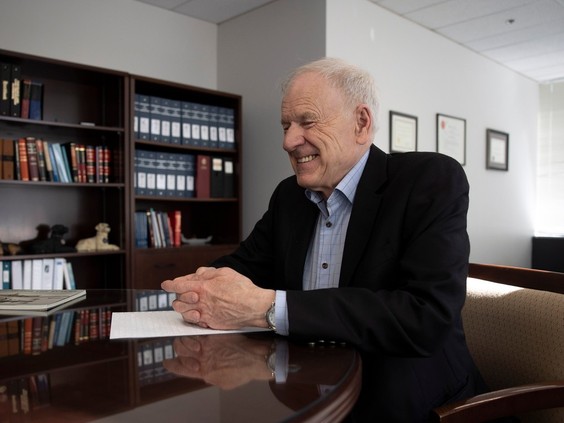
The Saskatchewan Information and Privacy Commissioner said access to information fees can be high for a number of reasons, like material volume and redaction work involved.
Larissa Kurz, Regina Leader-Post
The Ministry of Education is quoting a fee of more than $1,600 to release records related to the volume of public support and development process of the new pronoun consent policy rolled out in August.
Two separate Freedom of Information and Protection of Privacy Act (FOIP) access to information requests submitted by the Regina Leader-Post on Aug. 28 — ahead of any court action over the policy now underway — returned a combined cost estimate of $1,680 to process.
The first request, asking for correspondence with the Minister of Education’s office between June 19 and Aug. 25 related to a sex education related incident at Lumsden School, was quoted at 20 hours to search and 16 hours to process records for disclosure.
At $15 per hour, that tallies a fee of $1,020.
The second request, asking for correspondence with the minister’s office over the same time frame related to “pronouns, gender and the development of the Use of Preferred First Name and Pronouns by Students policy,” was quoted 16 search hours and 6 processing hours, for a fee of $660.
Neither request includes costs for printing requested records.
A spokesperson from the Saskatchewan NDP said a similar access to information request was also returned with “comparable” fees attached.
“We sincerely hope the price tag for this information request is not meant to discourage Saskatchewan people from asking the Sask. Party tough questions,” said press secretary Landen Kleisinger, in an email statement Tuesday.
“The public ought to know what their government is doing and how they are spending their money.”
Information and Privacy Commissioner Ronald Kruzeniski said processing FOIP requests can be “complex,” and a number of factors can lead to fees returning high.
Fee estimates are provided after a request has been filed, and the institution completes a preliminary track on the relevant files. Some details cannot be shared per privacy legislation, and so processing includes work to redact materials line by line before delivery.
Kruzeniski said this can take significant time when materials contain personal details, or are housed in large databases such as those government institutions maintain.
Digital records also have different complexities than paper records, and one medium isn’t necessarily less work than the other, he explained.
“The more lines they sever, the more time it takes,” Kruzeniski said. “That’s what is time-consuming.”
Kruzeniski also said there may be more caution from institutions “sensitive” about protecting personal information, to mitigate privacy breaches.
He hasn’t seen a “notable trend” provincially, but said instances are increasing both nationally and internationally.
“It’s expensive for them to correct those,” he said. “And it’s a reputational risk.”
Secret Canada, a national investigation by the Globe and Mail published in June, found that seven per cent of 2021 FOIP requests answered by Saskatchewan ministries provided full access, 53 per cent partial access and 36 per cent gave no documents.
To address high fees, Kruzeniski said applicants can refine their requests to narrow down material volume and subsequent search hours, or appeal fee estimates within a year of delivery.
The commissioner’s office has investigated and concluded seven such appeals in 2023 so far, equal to those in all of 2022. Six appeals were finished in 2021 and 3 in 2020.
A sworn affidavit from assistant deputy minister Michael Walter, filed by the provincial government in a legal action over the policy last week, has since said the minister received 18 letters between June and August from people about pronoun use in schools, used to prompt the policy.
Those letters refer to a similar policy introduced in New Brunswick in June and each “expressed the constituent’s support for the revisions and indicated they were in favour of creating a policy similar to Policy 713 in Saskatchewan.”
Walter also said, in his affidavit, that he “received instructions from the Minister’s office to begin the development” of what became the pronoun consent policy on Aug. 9.
A final draft was delivered internally on Aug. 18, with “language of the policy finalized on Aug. 21.” It was announced publicly by former education minister Dustin Duncan on Aug. 22.
These details from Walter, spoken to only briefly in open court, have not yet been tested or proven, but are likely to be included in the Leader-Post’s FOIP request.
The Ministry of Education, responding to a request for comment on the work hours quoted in the Leader-Post’s FOIP requests, said fees are calculated using “staff time” to find, pull, read and redact information in records.
An applicant is granted two hours of such work free, said Kruzeniski, and often institutions may consider waiving fees under $100 of their own volition. The Saskatchewan government is one such entity that does.
Kruzeniski would like to see that rule of thumb increased to $200, in today’s climate.
“In a democracy, it’s really important that people get access to information so that they can form opinions, express those opinions,” he said.
“We do have to live by the regulations that exist (and) we do need to strike a balance in terms of how much information people can get.”
lkurz@postmedia.com

